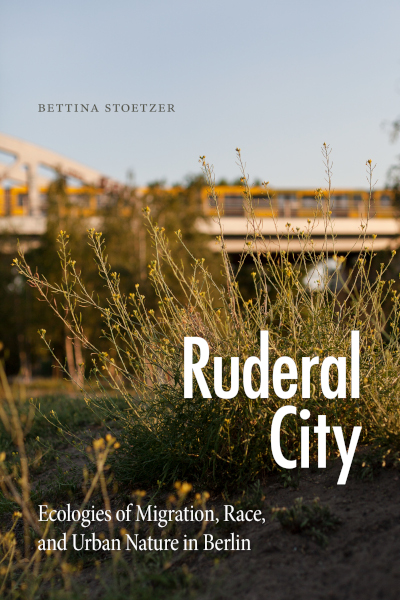The publication of Bettina Stoetzer’s Ruderal City forms part of a wave of new literature on different aspects of urban nature. As an anthropologist, Stoetzer brings a distinctive set of methodological and conceptual tools to her fascinating exploration of post-war nature in and around Berlin. A notable feature of her approach is the combination of multispecies ethnographies with a decolonial sensibility, drawing on a wide range of influences including Donna Haraway, Ann Laura Stoler and Anna Tsing.
The book is broadly structured around three themes: the emergence of scientific interest in unusual urban ecologies developing within the ruined landscapes of the post-war city; the contested use of public or vernacular spaces of nature such as gardens and parks for cooking, recreation and other activities; and the placement of refugees within the peripheral zones of nature beyond the metropolitan boundaries of the city. In each of these cases the idea of nature is problematized in relation to questions of race, nationalism and traces of global history within the city. Stoetzer shows, for instance, how the barbecuing of meat by immigrant communities in public parks has become a focal point for xenophobic anxieties over a disordered public sphere.
In her account of the experience of refugees housed in former military barracks located deep in the forests beyond the edge of the city, Stoetzer reworks the psychoanalytic trope of the uncanny (unheimlich) to emphasize intense forms of cultural and spatial estrangement. Her account segues into a compelling reflection on the role of forest landscapes as a focal point for the cultural and political ambiguities of ‘wildness’ and ‘wilderness’ under the multiple dislocations of the post-socialist transition. It would be interesting to follow this line of argument back into the city through the recent promotion of ‘urban wilderness’ (Stadtwildnis) as an element in contemporary park design (there is even a nature reserve in Vienna called Stadtwildnis).
Stoetzer uses the idea of the ‘ruderal’, derived from the Latin word rudus meaning ‘rubble’ or ‘debris’, as the connecting thread for her argument as well as an analytical lens through which to interpret distinct and often disparate cultures of urban nature, noting how specific plants can serve as ‘ambivalent indicators’ for traces of European history—including episodes of geopolitical upheaval and legacies of global migration. What might be the implications of Stoetzer’s argument for urban ecologies outside Europe? It would be interesting to explore how the ‘ruderal analytic’ might be applied in cities of the global South, for example, where the discourse of ecological disturbance sometimes plays out differently, especially where introduced species are more closely associated with legacies of European colonialism.
Another point of further reflection might be the existing lineage of the ‘ruderal’ within vegetation science, such as Sheffield-based botanist J. Philip Grime’s development of the so-called CSR (competitor, stress-tolerator, ruderal) model in the 1970s to explore the ecological dynamics of disturbed sites. Here, perhaps, we encounter ambiguities at the interface of field-based modes of scientific enquiry and a variety of other methodological strategies for the investigation of marginal or interstitial spaces.
Ruderal City is a highly innovative addition to studies of urban nature that opens up wider critical reflections on the future of European cities. The material will appeal to diverse audiences across anthropology, ecology, geography, sociology and other disciplines. Stoetzer’s book is itself a testament to her emphasis on ‘creativity at the margins of the city’ (p. 242) and provides a vibrant platform for multiple voices—both human and non-human—that have been routinely obscured in contemporary urban environmental discourse.
Matthew Gandy, University of Cambridge
Bettina Stoetzer 2022: Ruderal City: Ecologies of Migration, Race, and Urban Nature in Berlin. Durham, NC: Duke University Press. Cover used with permission of Duke University Press
Views expressed in this section are independent and do not represent the opinion of the editors.

